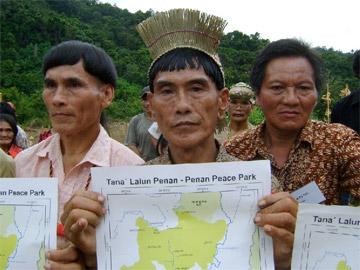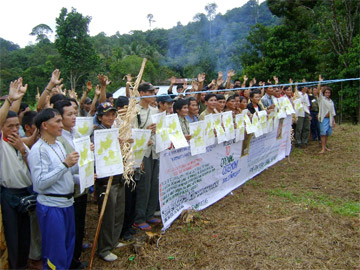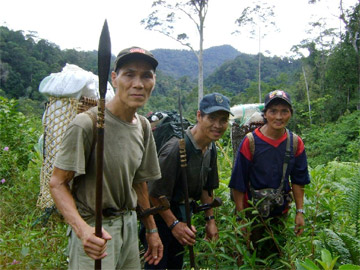In an attempt to block destructive logging of their traditional land, a group of indigenous Penan has declared a “peace park” in the Upper Baram region of Sarawak in Malaysian Borneo, reports the Bruno Manser Fund.
The “Penan Peace Park” includes 1630 square kilometers (163,000 hectares) around the Gunung Murud Kecil mountain range near to the Indonesian border. The area serves as a corridor two existing Pulong Tau National Park in Malaysia and the Indonesian Kayan Mentarang National Park.
The area is also slated for logging. The government of Sarawak has concessioned the forest for logging by Samling, a Malaysian timber company. The Penan — who have long battled logging in Sarawak’s rainforests, which have been heavily degraded and greatly reducced since the 1980s — hope that the declaration of the indigenous park will help them in their efforts to get the Malaysian government to recognize their historical presence in the area. The Penan currently have two land rights suits against the Sarawak state government.
 Headman Jawa Nyipa (center) of Long Ajeng presents a map with the boundaries of the new “Penan Peace Park”
|
“As nomadic hunter-gatherers, we Penan people have been roaming the rainforests of the Upper Baram region for centuries,” James Lalo Kesoh, the former penghulu (regional chief) of the Upper Baram region, was quoted as saying by the Bruno Manser Fund during the inauguration ceremony for the park. “Even though we have settled down and started a life as farmers since the late 1950s, we still depend on the forests for our food supply, for raw materials such as rattan for handicrafts, for medicinal plants and for other jungle products. Our entire cultural heritage is in the forest and needs to be preserved for future generations.”
“The conservation of our forest is our highest priority. Without the forest, we cannot survive,” Jawa Nyipa, headman of Long Ajeng, a village in the Upper Baram, told Bruno Manser Fund. “We call this park ‘Peace Park’ because peace (‘lawi’) is a very important concept in our culture. We wish to live peacefully together with our neighbouring tribes and as fully recognized Malaysian citizens.”
The Penan, some of whom still live as nomadic hunter-gatherers in the rainforests of Sarawak, have been battling loggers since the 1980s, when large-scale industrial logging commenced in the Malaysian state. At times they have faced intimidation and violent crackdowns at the hands of security forces hired by logging firms and Malaysian police. In January 2008 a Penan chief, Kelesau Naan, was allegedly murdered for his longtime opposition to logging. In September Malaysian security forces broke up roadblocks the Penan had set up to prevent forestry companies from accessing the Upper Baram forest.
Meanwhile vast tracts of Sarawak’s rainforest has been stripped of its valuable timber. Now forestry firms are coveting forest lands for conversion to oil palm plantations, which will likely leave the Penan even worse off since these estates support less game than even logged-over forest.
The plight of the Penan made international headlines in the 1990s due a campaign by Bruno Manser, a Swiss national, who disappeared under mysterious circumstances in 2000. Since then the cause has been championed by the Bruno Manser Fund.
This article used information provided by the Bruno Manser Fund.
Related articles
















